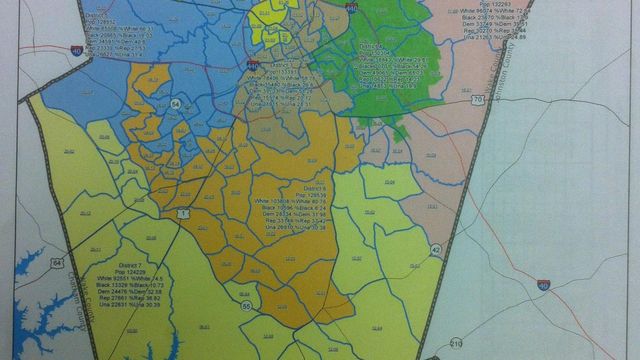Appeals court tosses district maps for Wake commissioners, school board
A federal appeals court on Friday ruled that new voting district maps for the Wake County Board of Commissioners and the Board of Education are unconstitutional because they violate equal representation rules.
Posted — UpdatedThe ruling raises questions for the November election. Candidate filing for the school board closed Friday, while candidates for the Board of Commissioners were selected in the March primary.
Although the court majority wrote in a footnote to its 44-page opinion that there is "no reason" for the elections to proceed under the invalidated maps, Wake County elections director Gary Sims and county Board of Elections Chairman Brian Ratledge said they are reviewing the opinion to determine how it might affect the election.
"All we can say with certainty is we cannot hold elections under those districts," said Anita Earls, executive director of the Southern Coalition for Social Justice, which represented the plaintiffs in the case.
School board Chairman Tom Benton said elections should be held under maps drawn after the 2010 census.
"We are all pleased and relieved that the districts as drawn have been ruled as unconstitutional. We urge our local delegation in the General Assembly to simply revert back to the original plan's districts and terms," Benton said in an email. "However, if they choose to seek a change, we would strongly encourage them to set a process that provides for local control of local elections and not the state General Assembly determining how Wake County elects its local Boards."
Sen. Chad Barefoot, R-Wake, who sponsored the legislation creating the new Board of Commissioners districts, called the decision "unconscionable," saying the court "quashed an effort to increase representation and geographic diversity" on the boards.
"We are evaluating our legal options to make sure Wake County voters don’t lose their fundamental right to vote in November," Barefoot said in a statement.
But top lawmakers in the House and the Senate said no redistricting bill would be introduced before the General Assembly adjourns for the year on Saturday.
"I just don't have time to do it," said Rep. David Lewis, R-Harnett, chairman of the House Elections Committee. "It's a lot harder than making a tweak."
When asked if he thought revamped voting maps for Wake County would pass before the end of the session, Senate Rules Committee Chairman Tom Apodaca, R-Henderson, said simply, "I do not."
Districts changed after Democrats seized power
State lawmakers overhauled Wake County's school board districts in 2013, switching from nine single-member districts to seven districts plus two regional districts – one covering the urban center of the county and the other the ring of suburban and rural areas around the edge of the county. Last year, lawmakers adopted a similar map for the Board of Commissioners, which currently has seven members voted on countywide.
Opponents of the maps noted that the Republican-controlled legislature put the new maps in place after Democrats took control of each board, and a group of voters challenged the changes in court, alleging at least one district was racially gerrymandered and that the number of voters in each of the single-member districts varied by up to 7 percent and by up to 10 percent in the two regional districts.
State lawmakers refused to defend the maps, leaving it up to the Wake County Board of Elections. Although the elections board put up no evidence, U.S. District Judge James Dever upheld the maps in December.
"Plaintiffs proffered uncontroverted evidence of an illegitimate factor predominating in the skewed, unequal redistricting: an attempt to guaranty Republican victory through the intentional packing of Democratic districts," Judge James Wynn wrote for the majority.
During the December trial, for example, a political science professor from the University of Michigan testified that, based on hundreds of computer simulations, there was no explanation for the district lines on the new maps other than to benefit Republican candidates.
Emails between lawmakers and Wake County Republican Party officials that were introduced at the trial discussed how the GOP could win a majority of seats on the reconfigured boards.
"Rather than seeking proportional representation of the two main political parties, the evidence shows that the challenged plans under-populated Republican-leaning districts and over-populated Democratic-leaning districts in order to gerrymander Republican victories," Wynn wrote. "In other words, the challenged redistricting here subverts political fairness and proportional representation and sublimates partisan gamesmanship."
The majority scoffed at the various rationales lawmakers used to justify the maps – increased representation, reduced campaign costs and increasing voter turnout – calling those arguments mere pretexts to accomplish a partisan goal. The judges noted Democratic lawmakers put forward other plans that would have accomplished those goals without overhauling the voting maps, but Republican legislators turned those ideas aside.
"This decision is an important recognition that redistricting is not a free-for-all," Earls said in a statement. "The Constitution provides safeguards to ensure that partisan gamesmanship does not interfere with the right an equal vote. Every voter’s vote should be weighted equally."
Perry Woods, one of the voters who sued over the redrawn districts, said state lawmakers should leave Wake County alone.
"This is not good governance," Woods said. "No one on the school board asked for this. The new county commission didn't ask for this. It's been a pure power play, and I suspect we'll see more from this legislature."
The court dismissed the racial gerrymander claim, but Judge Diana Gribbon Motz said the equal representation claim should have been dismissed as well.
"Faced with the heavy burden of proving that assertedly illegitimate 'partisanship' constituted the predominant motivation for the presumptively constitutional redistricting plans, Plaintiffs failed to offer any evidence truly probative of legislative intent," Motz wrote in her 15-page dissent.
Related Topics
• Credits
Copyright 2024 by Capitol Broadcasting Company. All rights reserved. This material may not be published, broadcast, rewritten or redistributed.





